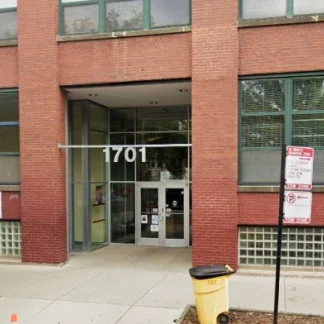WestCare - Cook County Jail IMPACT Program
WestCare - Cook County Jail IMPACT Program is a therapeutic community that provi...
Erie Family Health Center is an outpatient mental health care facility and drug and alcohol rehab for youth and adults in Chicago, Illinois. The center specializes in telehealth care, crisis intervention, dual diagnosis services, medication assisted treatment (MAT), short-term general outpatient programs (OP), and aftercare planning and support.
The center specializes in age-specific services. They offer targeted programs for children, adolescents, young adults, and seniors. They also provide treatment for persons with co-occurring addiction and mental illness.
The short-term general outpatient programs (OP) provide up to six months of care and include medical and mental health assessments, personalized care planning, and case management. Clients engage in intensive individual, group, and family counseling drawing on proven modalities, including CBT, DBT, and ACT. The program also prioritizes age-specific, recovery-focused life-skills training that addresses topics such as coping, self-care, anger and stress management, and relapse prevention. Clients may be referred by their primary care provider to the evidence-based MAT program for longer-term pharmacotherapy using buprenorphine and/or naltrexone.
Their aftercare services ensure a complete continuum of care aligned with clients’ evolving needs. These services may include step-down support and referrals for additional medical, mental health, and social service programs.
Erie Family Health Center accepts private insurance, Medicare, Medicaid, sliding-scale payment schedules, and self-pay.
Contact us for more information: (312) 666-3488

Connect with Erie Family Health Center by calling their admissions team directly.
(312) 666-3488 Website Get DirectionsWhether a marriage or other committed relationship, an intimate partnership is one of the most important aspects of a person's life. Drug and alcohol addiction affects both members of a couple in deep and meaningful ways, as does rehab and recovery. Couples therapy and other couples-focused treatment programs are significant parts of exploring triggers of addiction, as well as learning how to build healthy patterns to support ongoing sobriety.
Research clearly demonstrates that recovery is far more successful and sustainable when loved ones like family members participate in rehab and substance abuse treatment. Genetic factors may be at play when it comes to drug and alcohol addiction, as well as mental health issues. Family dynamics often play a critical role in addiction triggers, and if properly educated, family members can be a strong source of support when it comes to rehabilitation.
Group therapy is any therapeutic work that happens in a group (not one-on-one). There are a number of different group therapy modalities, including support groups, experiential therapy, psycho-education, and more. Group therapy involves treatment as well as processing interaction between group members.
In individual therapy, a patient meets one-on-one with a trained psychologist or counselor. Therapy is a pivotal part of effective substance abuse treatment, as it often covers root causes of addiction, including challenges faced by the patient in their social, family, and work/school life.
Research clearly demonstrates that recovery is far more successful and sustainable when loved ones like family members participate in rehab and substance abuse treatment. Genetic factors may be at play when it comes to drug and alcohol addiction, as well as mental health issues. Family dynamics often play a critical role in addiction triggers, and if properly educated, family members can be a strong source of support when it comes to rehabilitation.
Group therapy is any therapeutic work that happens in a group (not one-on-one). There are a number of different group therapy modalities, including support groups, experiential therapy, psycho-education, and more. Group therapy involves treatment as well as processing interaction between group members.
In individual therapy, a patient meets one-on-one with a trained psychologist or counselor. Therapy is a pivotal part of effective substance abuse treatment, as it often covers root causes of addiction, including challenges faced by the patient in their social, family, and work/school life.
Group therapy is any therapeutic work that happens in a group (not one-on-one). There are a number of different group therapy modalities, including support groups, experiential therapy, psycho-education, and more. Group therapy involves treatment as well as processing interaction between group members.
In individual therapy, a patient meets one-on-one with a trained psychologist or counselor. Therapy is a pivotal part of effective substance abuse treatment, as it often covers root causes of addiction, including challenges faced by the patient in their social, family, and work/school life.
In individual therapy, a patient meets one-on-one with a trained psychologist or counselor. Therapy is a pivotal part of effective substance abuse treatment, as it often covers root causes of addiction, including challenges faced by the patient in their social, family, and work/school life.
WestCare - Cook County Jail IMPACT Program is a therapeutic community that provi...
Above and Beyond Family Recovery Center is a licensed Level I and Level II outpa...
Cornell Interventions is a private rehab located in Chicago, Illinois. Cornell I...
McDermott Center – Men’s Detox is a non-profit rehab located in Chicago, Illinoi...